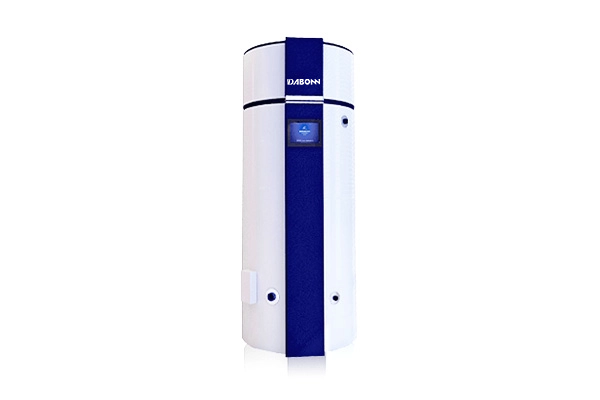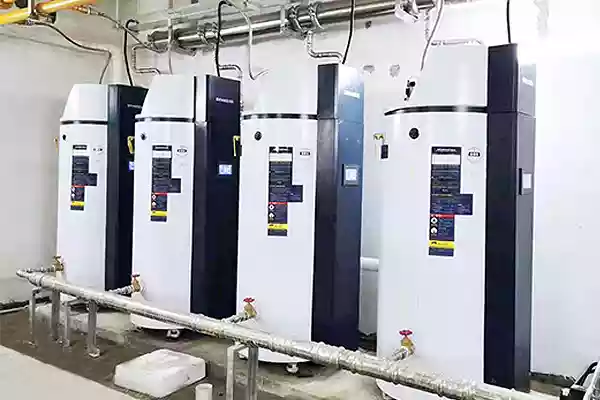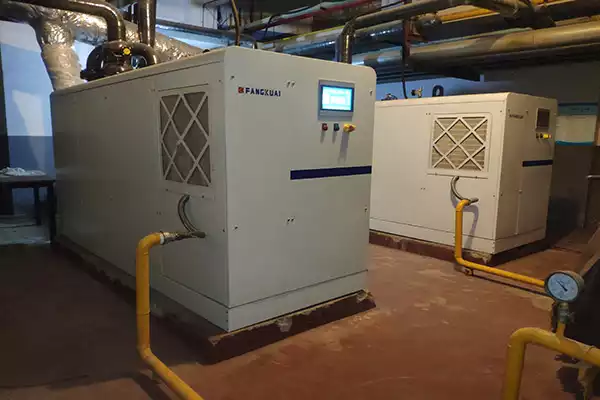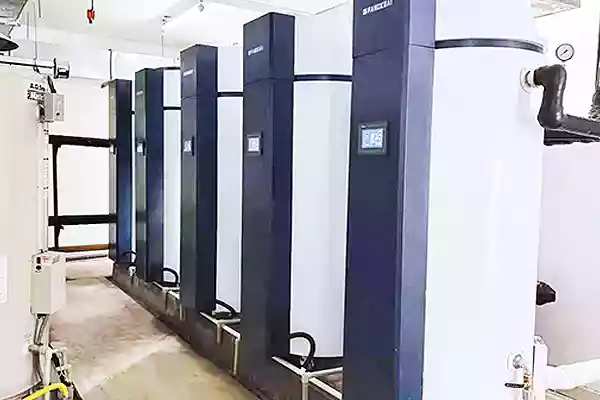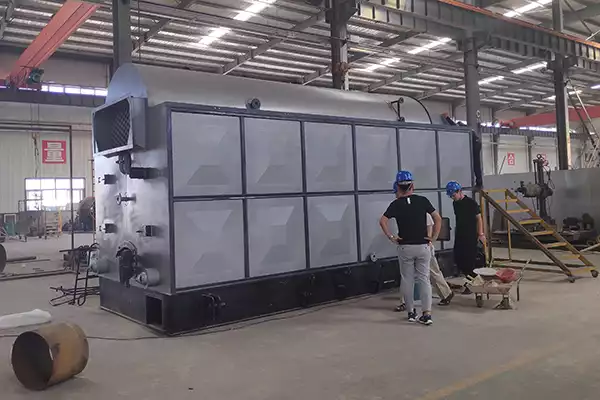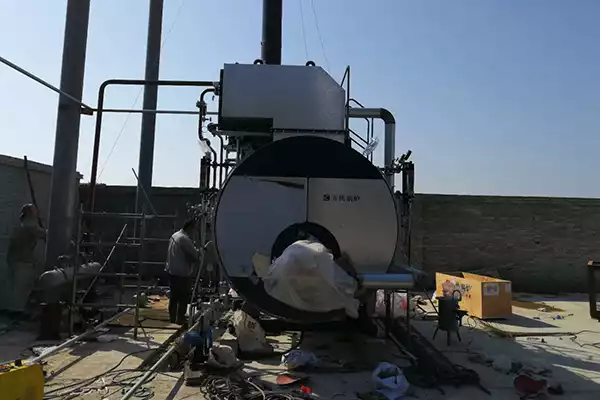Natural gas boilers cost approximately $2,500 to $8,000. They are one of the most popular types of heating and cooling systems because it’s affordable and easy to use. In this article, we explore the ins and outs of natural gas boilers, from their features and benefits to maintenance and cost considerations.
What is a natural gas boiler?
A natural gas boiler is a heating appliance that uses natural gas as its fuel source to provide warmth and hot water for residential or commercial spaces. It efficiently burns natural gas in a combustion chamber, producing heat that is transferred to the water circulating within the boiler’s system.
How do natural gas boilers work?
Natural gas boilers work by igniting natural gas in a burner, creating a flame that heats up the heat exchanger. The heat exchanger transfers the generated heat to the water circulating within the system. As the water absorbs the heat, it becomes hot and is distributed through pipes or radiators to provide heating for the building. The process is controlled by a thermostat, allowing users to adjust the temperature according to their comfort.
What are the advantages of a natural gas boiler?
Natural gas boilers offer several advantages. Firstly, natural gas is a clean-burning fuel, resulting in lower emissions compared to other fossil fuels. Secondly, natural gas is widely available and has a relatively stable supply, ensuring consistent heating throughout the year. Additionally, they are known for their high energy efficiency, which can lead to cost savings on energy bills. Lastly, they provide reliable and instant heat, ensuring a comfortable living or working environment.

How do you calculate the efficiency of a gas boiler?
To calculate the efficiency of a gas boiler, you can use the Annual Fuel Utilization Efficiency (AFUE) rating. AFUE represents the percentage of heat produced by the boiler that is actually utilized for heating the space or water. Here’s how you can calculate it:
- Subtract the boiler’s annual heat loss from the total heat produced. This gives you the useful heat output.
- Divide the useful heat output by the total heat input (fuel energy supplied to the boiler).
- Multiply the result by 100 to get the efficiency percentage.
The formula for calculating AFUE is:
AFUE = (Useful Heat Output / Total Heat Input) x 100
For example, if a boiler produces 100,000 BTU/hr of useful heat output and consumes 120,000 BTU/hr of fuel energy, the AFUE can be calculated as:
AFUE = (100,000 / 120,000) x 100 = 83.33%
This means the boiler is 83.33% efficient in converting fuel energy into usable heat. Remember, AFUE provides an estimate of efficiency based on standardized conditions, and actual efficiency can vary depending on factors such as operating conditions and maintenance.
What is the difference between a natural gas furnace and a boiler?
The main difference between a natural gas furnace and a boiler lies in their operation and purpose. A furnace primarily generates heat by burning fuel (such as natural gas) and distributes warm air throughout the building using ductwork and vents. On the other hand, a boiler uses natural gas to heat water, which is then circulated through pipes or radiators to provide heat. While furnaces are suitable for forced-air heating systems, boilers are ideal for hydronic heating systems, which use water as the heat transfer medium.

How do you maintain your natural gas boiler?
Proper maintenance is essential to ensure the optimal performance and longevity of your natural gas boiler. Regular tasks include:
- Annual servicing by a qualified technician to check for any issues and ensure the boiler operates efficiently.
- Regularly inspecting and cleaning the boiler’s components, such as burners, heat exchangers, and vents.
- Checking and adjusting water pressure and temperature levels according to boiler manufacturer guidelines.
- Regularly removing debris or sediment from the boiler’s system and ensuring proper water flow.
- Checking and replacing air filters if applicable.
- Ensuring proper ventilation and clear air intake pathways for the boiler.
What is the cost of a natural gas boiler?
The cost of a natural gas boiler can vary depending on factors such as size, brand, efficiency rating, additional features, and installation requirements. On average, a residential natural gas boiler can cost anywhere between $2,500 to $8,000, not including installation.
| Boiler Size (BTU) | Efficiency (%) | Base Cost | Installation Cost | Maintenance Cost |
|---|---|---|---|---|
| 80,000 – 100,000 | 85 – 89 | $2,500 – $3,500 | $1,500 – $2,500 | $200 – $400 per year |
| 100,000 – 120,000 | 90 – 94 | $3,500 – $4,500 | $2,000 – $3,500 | |
| 120,000 – 150,000 | 95 – 97 | $4,500 – $6,000 | $2,500 – $4,000 | |
| 150,000 – 180,000 | 98+ | $6,000 – $8,000 | $3,000 – $5,000 |
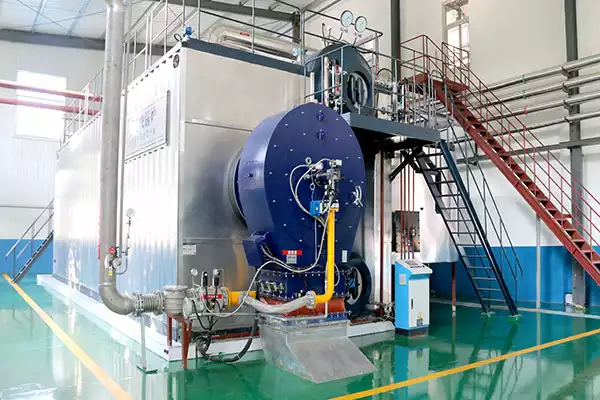
Conclusion.
If you’re looking for a natural gas boiler, it’s important to know the facts. The cost can vary depending on your needs and the type of boiler that you purchase. You should also consider whether or not this cost is worth it for your family and home.
FAQS.
What is the function of a natural gas boiler?
A natural gas boiler's primary function is to provide heating for residential or commercial buildings. It achieves this by burning natural gas to generate heat, which is then distributed through radiators or underfloor systems, ensuring a warm and comfortable environment during colder months.
What is the difference between LPG and natural gas boilers?
The main difference between LPG (liquefied petroleum gas) and natural gas boilers lies in the fuel source. LPG boilers use propane or butane gas stored in tanks, while natural gas boilers utilize the gas supply from a dedicated pipeline.
How long do natural gas boilers last?
On average, a well-maintained natural gas boiler can last between 15 and 20 years. However, the lifespan can be influenced by factors such as usage patterns, maintenance practices, and the quality of installation. Regular maintenance and timely repairs can extend the life of a boiler.
How efficient is a natural gas boiler?
Natural gas boilers can achieve high levels of efficiency. Modern condensing boilers, for example, can reach efficiencies of over 90%, meaning that more than 90% of the energy from the fuel is effectively converted into heat. This high efficiency helps to reduce energy waste and lower heating costs.
How much power does a natural gas boiler use?
Typically, a residential natural gas boiler can have a power rating ranging from 50,000 to 200,000 British thermal units per hour (BTU/h). The power consumption of it varies depending on its size and heating capacity.
Get your best price
Quickly compare 3 FREE quotes
- Engineer quick quote
- The overall delivery speed is fast
- Financial choice
- Low installation costs and cost savings
25 years+ of boiler R&D
More than 20 innovative technologies
PRODUCT
-
Gas Boilers
-
Oil Boilers
-
Electric Boilers
-
Coal Boilers
-
Biomass Boilers
-
Industrial Boilers

